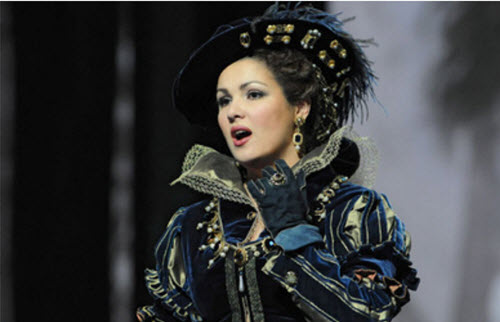
 Austria Donizetti: Anna Bolena, Wiener Staatsoper Orchestra and Chorus, Andriy Yurkevich (conductor), Staatsoper, Vienna, 10.4.2015 (JMI)
Austria Donizetti: Anna Bolena, Wiener Staatsoper Orchestra and Chorus, Andriy Yurkevich (conductor), Staatsoper, Vienna, 10.4.2015 (JMI)
Cast:
Anna Bolena: Anna Netrebko
Percy: Celso Albelo
Giovanna Seymour: Ekaterina Semenchuk
Enrico VIII: Luca Pisaroni
Smeton: Margarita Gritskova
Lord Rochefort: Dan Paul Dumitrescu
Sir Hervey: Carlos Osuna
Production: Staatsoper Vienna
Direction: Eric Génovèse
Sets: Jacques Gabel and Claire Sternberg
Costumes: Luisa Spinatelli
Lighting: Bertrand Couderc
My trip to Vienna has come to an end with this Donizetti opera, so popular in his time yet almost forgotten today. But like so many other bel canto works, it is well received by the modern public when offered under proper conditions. Anna Bolena demands an exceptional protagonist and a strong cast or it doesn’t work, and it appears that the Staatsoper sees it the same way. Anna Netrebko has returned to sing the role after her debut here four years ago. The Russian diva had a great success in the part then, and she repeated it this time around.
With due respect to other glorious performers, the role of Anna Bolena requires a dramatic soprano along the lines of Maria Callas or Leila Gencer. Whatever the drawbacks that one might find in Anna Netrebko, she is the great Anna Bolena of our day and perfectly comparable to the leading divas of the past. As for tonal beauty, she does not cede primacy to any of them, including the two mentioned here. Her voice right now could not be more appropriate for the role of the unfortunate Queen of England. In addition, her projection is so strong that it makes no difference whether she sings at the front or at the back of the stage: in either case, her voice reaches the audience perfectly.
As for her interpretation, she was the Queen from her first entrance on stage. There are several key moments in the opera for me, and all were handled brilliantly. First comes the Act I scene with Jane Seymour in which both singers were just outstanding. Another important moment is the ensemble that ends Act I with the phrase “Giudici ad Anna,” where Ms. Netrebko showed all her surprise and anger to perfection. Then there is the aria “Al dolce guidami” (which seems written for Edita Gruberova), where Anna Netrebko did extremely well, singing in a very moving way although I missed a better use of vocal agility. Finally, “Coppia inicua” had the strength and brilliance that it requires, even though this was a particularly demanding version of the opera which restored almost all the traditional cuts. All in all, it was a superb performance by Anna Netrebko, who was received in triumph by the audience, which she richly deserved.
Celso Abelo played the part of Percy, and he was less convincing than on other occasions. He was a bel canto tenor at all times, including the prison scene with the famous and difficult “Vivi tu” and the subsequent cabaletta. I’m not sure what the reason is, but from his first entrance on stage his voice did not sound as we have heard it in the past. Only when he went to the high notes did he clearly shine. He improved in the second act, but he still was not at his best.
When Anna Netrebko debuted in the character of Anna Bolena four years ago, Eīina Garanča sang the part of Giovanna Seymour. She is now in Vienna, but appearing in Der Rosenkavalier. Her post was occupied by Ekaterina Semenchuk, whose presence in this cast puzzled me as she is not what we consider a bel canto specialist. However, her performance was excellent and very convincing, especially in vocal terms. I must say that she made me forget about Eīina Garanča.
Luca Pisaroni was a consummate bel cantista in the character of Henry VIII, but his voice is not particularly suited to the requirements of the character. Pisaroni is an excellent Mozart singer, as he has proved many times, but Enrico requires a vocal weight that he doesn’t have. It is comparable to casting a light soprano as Anna Bolena.
Smeton was played by mezzo soprano Margarita Gritskova who has an attractive voice, but one that is rather reduced in size, especially in the low notes. Smeton needs a true contralto, which she is not.
Dan Paul Dumitrescu was good as Lord Rochefort. His voice is large and dark, more appropriate than Pisaroni’s for Henry VIII. Finally, tenor Carlos Osuna did well as Hervey.
The musical direction was entrusted to Andriy Yurkevych. He is one of the conductors who usually accompanies Edita Gruberova in her concerts, which means he knows perfectly what he is supposed to do in these operas. His reading was note-worthy, better than that of other conductors in the same repertoire. As I indicated above, he led the most complete version of the work that we’ve seen in a theatre, which also happened when he conducted Bolena at Barcelona’s Liceu. As always, I have no complaint ̶ rather the opposite ̶ for the orchestra’s performance. The chorus was also quite good, especially the women in the Act II.
Eric Genovese’s production had its premiere with the debut of Anna Netrebko in 2011. On that occasion the creative team was booed. Some considered the staging outdated, and others thought it very modern. I would say that it’s an effective production without great interest. It narrates the story properly, and is based on some rotating blocks which serve for fast scene changes. There are period costumes which are especially attractive for the Queen. The direction features nothing of particular interest, but one should note the presence of Anna Bolena’s daughter, the future Elizabeth I, in the prison scene.
The Staatsoper was fully sold out. The audience rewarded Anna Netrebko with a standing ovation and a storm of flowers. There were also sound cheers for Ekaterina Semenchuk.
José M. Irurzun